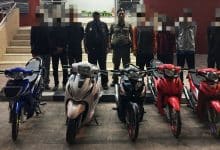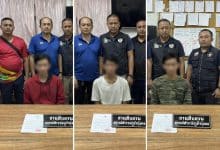Police arrest Russian gang leader for sale of counterfeit passports

Thai immigration officials apprehended the leader of a Russian gang involved in the production and distribution of counterfeit passports. The operation, which caused damages exceeding 30 million baht, had its manufacturing hub in the Dominican Republic before smuggling the fake documents into Thailand.
Today, July 10, the Immigration Bureau held a press conference to announce the arrest of 44 year old Artem, a Russian national. He was detained under an arrest warrant issued by the Bangkok South Criminal Court for making, importing, and selling counterfeit passports. The investigation revealed that the gang was part of a larger transnational criminal organisation.
The investigation began when officers from the Immigration Division 4, working with the Transnational Crime Investigation Division, received photographs of counterfeit US passports. The anomalies in the passport images raised suspicions, prompting officials to contact the Overseas Criminal Investigations Unit (OCI) of the United States in Thailand. The OCI confirmed that the passports were indeed fake.
Further inquiries revealed that the gang advertised their services on platforms like VK, Telegram, WhatsApp, and their website, claiming they could produce passports from 15 countries through legitimate means.
Payments were made via digital currency accounts, and a company was established in Thailand to add credibility to their operations.
Many victims, deceived by these claims, either never received their passports or received counterfeit ones. The fake passports were shipped from the Dominican Republic through the courier company FedEx. The investigation identified Artem as the leader of the operation in Thailand.
Armed with evidence, police and immigration officers sought and obtained a warrant from the Bangkok South Criminal Court to conduct a search and arrest the gang leader.
Artem was apprehended at his condominium in Bang Rak, Bangkok. Seized during the arrest were mobile phones, a laptop, bank books, and foreign credit cards. The investigation uncovered a well-organised operation with distinct roles, with associates in the Dominican Republic producing counterfeit passports, while Artem handled advertising, victim communication, and financial transactions, reported KhaoSod.
Latest Thailand News
Follow The Thaiger on Google News:


























